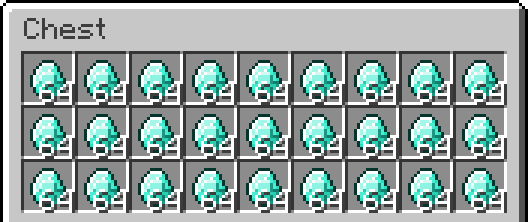22
3
Minecraft 1.12 will be released tomorrow, so let's celebrate!
Write code that takes in a non-negative integer N which represents the number of items of something in Minecraft. Output it in a way more helpful to players, giving the number of chests, stacks, and items N is equivalent to. Use the format
XcYsZi
where
Xis the number of chests you can completely fill with N items,Yis the number of stacks you can fill with the items remaining after filling chests,Zif the number of items remaining after filling chests and stacks.
Note that:
- 64 items fit in a stack. (We'll ignore items that stack to 16 or don't stack.)
- 27 stacks fit in a chest. (These are single chests, not double chests.)
So it would never make sense if Y is more than 26 or if Z is more than 63.
A caveat with the format is that if there is zero of something, that term is not printed.
So, for example, if
Ywere zero andXandZnonzero, the format would look likeXcZi.Likewise if
YandZwere zero andXnonzero, the format would beXc.The exception here is when N is zero. Then
0iis the output rather than an empty string.
You can assume all N items are of the same type, hence all stackable.
You may not output a list or tuple of three numbers. You must give a string with the exact "csi" notation, in that order, with no spaces or commas.
For reference, here's a chest completely filled with stacks of items:
Testcases
in -> out
0 -> 0i
1 -> 1i
2 -> 2i
62 -> 62i
63 -> 63i
64 -> 1s
65 -> 1s1i
66 -> 1s2i
127 -> 1s63i
128 -> 2s
129 -> 2s1i
200 -> 3s8i
512 -> 8s
1337 -> 20s57i
1664 -> 26s
1727 -> 26s63i
1728 -> 1c
1729 -> 1c1i
1791 -> 1c63i
1792 -> 1c1s
1793 -> 1c1s1i
4096 -> 2c10s
5183 -> 2c26s63i
5184 -> 3c
5200 -> 3c16i
9999 -> 5c21s15i
385026 -> 222c22s2i
1000000000 -> 578703c19s
The shortest code in bytes wins.

1Related – Leaky Nun – 2017-06-07T06:18:41.560
33ok apparently this is a crime scene investigation – Okx – 2017-06-07T06:30:16.910
1Related. – Martin Ender – 2017-06-07T06:39:52.570
@Okx I read the title and thought it was going to be some form of Clue/Cluedo but for minecraft. – caird coinheringaahing – 2017-06-07T15:13:00.427
@Okx with all the spinoffs that wouldn't be surprising. Now we need a challenge with drawing a chalk outline -- of a creeper perhaps – Chris H – 2017-06-08T09:01:09.903
Mulling it over now, but I don't think this challenge can be done in Minecraft. No way to concatenate the output string. Maybe I could display the result as an actual pile of chests, blocks, and items :) – BradC – 2017-06-08T21:06:15.997